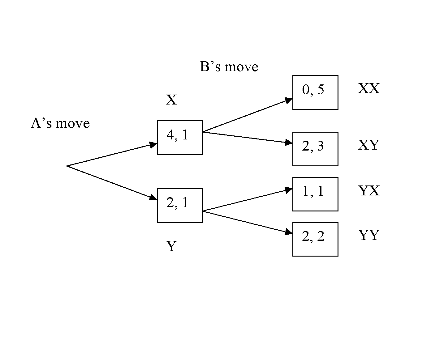President Kennedy’s famous order of preferences:
“There are three possibilities in descending order of preference, a decent democratic regime, a continuation of the Trujillo regime or a Castro regime. We ought to aim at the first, but we really can’t renounce the second until we are sure that we can avoid the third.”
Take a moment and lay out rational choices available to you. What seems like a desirable move at first may turn out to be a disaster. Other actors are also behaving rationally and sometimes not so rationally. You have to take into account their responses. Play the ‘game’ out as many moves ahead of time to see how it may play out. Then take your first move. Like Kennedy, you’ll find out that the Trujillo Regime option is the most feasible and desirable given your constrained options.
Take the most basic Game Theory tree:

If you are player A, your first move is deceptive. Option X gives you utility of 4; Option Y gives you a utility of 2. But whatever choice you make, B moves next. He will attempt to maximize his utility.
So if you pick X first to get a utility of 4 (4>2), B will respond with a move of X, which gives him a utility of 5 (5>3). The XX result is awful for player A.
You have to add up your total expected utility for all conceivable strategies and consequences. In this simplistic game, the expected utility of strategy X for player A is 0. The expected utility for strategy Y is 2. So A should rationally take the Y option, even if over the short term it seems less desirable.
In geopolitics, the problem grows very complicated with multiple actors. It turns out you have very few realistic options available. What is desirable is not feasible; what is feasible is not desirable. It can get very deterministic – you don’t have a true range of alternatives in many cases.
This is one of the reasons why public polling on international relations is contradictory. Polls pretend seemingly desirable options are actually feasible. When pollsters ask people about a policy – they ask as about a single move. So what happens next? Wait, wouldn’t a different nation rationally respond and make the situation even worse for us? Well, then, we shouldn’t do that, eh? So the public – not stupid, just shortsighted – offer contradictory answers even within the same poll. Such polls are verifiably worthless – it’s like blind chess moves.
I’m going to use Iraq as an example – although I want to strip away partisan debate for a moment.
Juan Cole suddenly discovers this principle at play in Iraq.
In all likelihood, when the Democratic president pulls US troops out in summer of 2009, all hell is going to break loose. The consequences may include even higher petroleum prices than we have seen recently, which at some point could bring back stagflation or very high rates of inflation.
In other words, the Democratic president risks being Fordized when s/he withdraws from Iraq, by the aftermath. A one-term president associated with humiliation abroad and high inflation at home? Maybe I should say, Carterized. The Republican Party could come back strong in 2012 and then dominate politics for decades, if that happened.
It is all so unfair…
Yes. Although I wouldn’t put it in terms of which party gains the most from a massive Middle Eastern war and an oil shortage that causes a global recession. It’s still the same principle. What seems desirable on the first move may turn out to be a catastrophe three or four moves later.
From the same Wall Street Journal Link, an Iraqi Sunni living in Diyala discovers the same thing:
“I want them to withdraw all their troops in one day.”
But, he added, dropping his voice: “There is something that I want to say although I hate to say it. The Americans forces, which are an ugly occupation force, have become something important to us, the Sunnis. We are a minority and we do not having a force to face the militias. If the Americans leave, it will mean a total elimination of the Sunnis in Iraq.
“I know I said I want them to leave, but if we think about it, then I have to say I want them to stay for a while until we end all the suspicions we have of each other and have a strong national government.”
The Sunnis would all like their ideal Sunni Empire over Iraq back. But realistically, it’s not going to happen. So they make due with the remaining options – support American peacekeeping or get butchered – even if they find them distasteful from an idealistic perspective.
In other words, the Sunnis decided a Trujillo Regime is better than a Castro Regime.
Our first choice is usually emotionally based and almost always infeasible. Keep that in mind the next time you hear a politician describing alternatives in a vacuum: “Gee, wouldn’t it be swell if we just did X?”
Well what happens after X? Stop and use reason.
Leave a comment